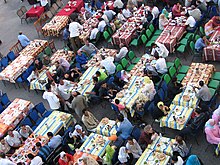Hem (islam)
| The 5 pillars of Islam |
|---|
The Arabic word hem ( Arabic صوم, DMG ṣaum ) or Siyam (صيام, DMG ṣiyām 'fasting', Persian روزه, DMG rūze , Turkish oruç ) denotes religious fasting in Islam .
Ramadan fasting
Fasting during Ramadan is one of the five pillars (basic duties) of Islam. Fasting during the entire month of Ramadan is normally compulsory for all adult and healthy Muslims . Here, the fasting people do not consume any food or stimulants daily between dawn and sunset and are not allowed to have sexual intercourse . The meal to break the fast in the evening is iftar ( Arabic إفطار, DMG ifṭār ). The last meal in the morning is called sahūr .
Other types of fasts
In addition to compulsory fasting in Ramadan, there are also various types of expiatory fasting and supererogatory fasting in Islam . Supererogatory fasting includes, for example, fasting on Ashura day and fasting in the month of Shābān . There is also a voluntary fast, which is restricted to certain days of the week.
Fasting bans
Fasting is forbidden on the two Islamic festivals, the Feast of Sacrifice and the three subsequent days and the Feast of Breaking the Fast, as well as on nights.
See also
literature
- Ralf Elger: Fasting . In Ralf Elger (ed.): Kleines Islam-Lexikon: history, everyday life, culture , CH Beck 2001, 5th expanded edition 2008, ISBN 978-3-406-57295-1 , pp. 100-101.
- Heinz Halm : Islam: past and present . CH Beck 2000, 7th edition 2007, ISBN 978-3-406-51917-8 , pp. 65-67.
- Klaus Lech: History of the Islamic Cult. Legal historical and ḥadīṯ-critical studies on the development and systematics of ʿIbādāt. Volume 1: The ramaḍān fast. Part 1. Otto Harrassowitz, Wiesbaden 1979.
- Vardit Rispler-Chaim: Disability in Islamic Law . Springer 2007, ISBN 978-1-4020-5051-0 , pp. 27-33.
- Colin Turner: Islam: The Basics . Routledge 2006, ISBN 978-0-415-34106-6 , pp. 111-117.
supporting documents
- ↑ The Qur'an, Sura 2, verse 187
- ↑ The majority of German translations of the Qur'an use the word dawn
- ↑ See Lech: History of Islamic Cults. 1979, p. 246.
- ↑ See Lech: History of Islamic Cults. 1979, pp. 138-153.
- ↑ See Lech: History of Islamic Cults. 1979, p. 246.
- ↑ ʿAbd al-Qāhir al-Baġdādī : Uṣūl ad-Dīn. Maṭbaʿat ad-Daula, Istanbul 1928. p. 213. Digitized
